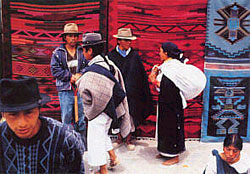 |
 |
 |
|
|||
|
Otavalo
Medicine Man By Karin Muller, 5/3/2002 Late in the afternoon, I stumbled across a crowd gathered four-layers-deep around a reedy, melodramatic voice. The normally reserved Indian women were standing up on tiptoes, craning their necks to see. A long-haired man in baggy pants was describing, with great enthusiasm and realistic pantomime, the local illnesses that his magic pills could cure. "Do you have gas?" he asked an older Indian paying rapt attention from the front row. "Are your farts in Otavalo heard and -- piueeew! -- carried on the wind all the way to Quito?" The audience roared while the old man nodded solemnly. "Do you eat and eat," (he guzzled like a pig at trough) "but have no energy to work?" His shoulders slumped forward and he shuffled half a step before falling to his knees. "Do you have trouble urinating? Diarrhea? Vomiting?" His list went on, each symptom more graphic than the last. The problem diagnosed ("Fear not, I will not abandon you in your time of need!"), he set about providing the cure. He mixed up fresh lemon juice, strained it through his teeth, and added honey ("not sugar, which dissolves the liver!"), and a few drops of food coloring ("stand back!"). The lumpy mixture turned fire-engine red and brought a communal gasp to the audience's lips. With great solemnity, he reached into his sleeve and withdrew a thick piece of aloe. He peeled it slowly, offering a non-stop litany of health cures and tips. "Avoid calcium! It weakens bones and causes oh-stee-oh-poroh-size. Do you know what that is? Bone cancer!" He squeezed the aloe until it oozed through his fingers into the blood-red pitcher. And finally, the magical ingredient -- natural medicine pills from distant Quito. With exquisite care, he opened up two capsules -- "Do NOT eat the wrappers! VERY poisonous!" - and tossed them over his shoulders in disgust. The gray powder cascaded into the brew. He stirred, then stood stock still. Silence. "Who will be first?" he thundered, holding up the pitcher like an offering to the gods. There was instant pandemonium as a hundred bodies strained forward, hands grasping at the air. He reached into the audience and drew out two squealing women, like contestants in a game show. Each received a dirty glass of clotted liquid. They drank. The crowd waited. They smiled, their lips stained blood red. Shouts and cheers. He doled out the drink in dribs and drabs, saying, "I am a poor man with but one set of clothes -- but it is my burden in life to cure the weak, the sick, the helpless..." The pitcher was almost empty. "A lemon, an aloe leaf and this" -- he'd timed it perfectly. The magic pills appeared. His spiel accelerated. Each one cost 2,000 Sucres -- forty cents -- in Quito. He was willing to part with a package of 8 pills and the recipe for how to mix them, and a book on illnesses and miraculous cures for the "bargain price" of 10,000 Sucres, about $2 -- an apparent loss of at least $1.20 per sale, but no one was doing the math. The audience surged forward to snatch up his packages. For a man who couldn't calculate a profit, he was lightning fast at making change. Over 50 customers shuffled off. The lemon sellers in the marketplace were in for a surprise.
|
|
Search
Savvy Traveler
|
|
